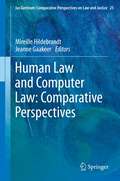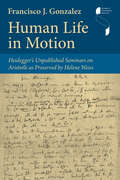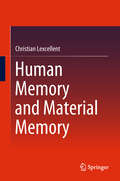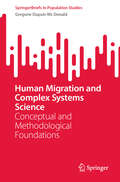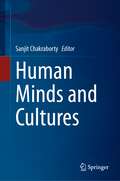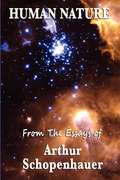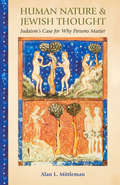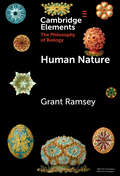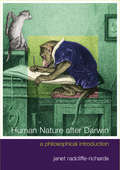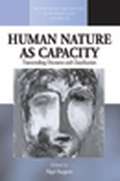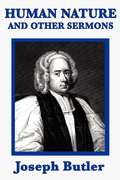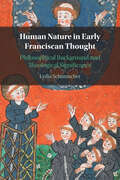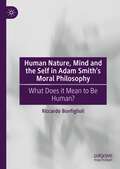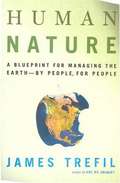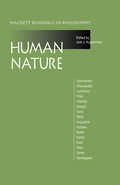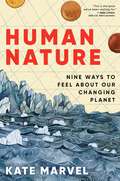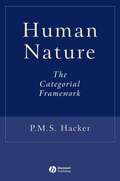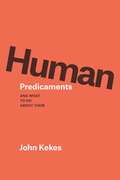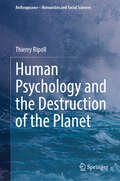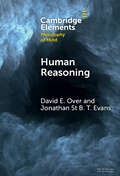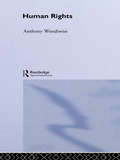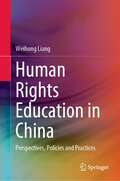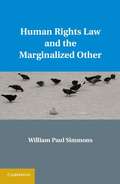- Table View
- List View
Human Law and Computer Law: Comparative Perspectives
by Jeanne Gaakeer Mireille HildebrandtThe focus of this book is on the epistemological and hermeneutic implications of data science and artificial intelligence for democracy and the Rule of Law. How do the normative effects of automated decision systems or the interventions of robotic fellow 'beings' compare to the legal effect of written and unwritten law? To investigate these questions the book brings together two disciplinary perspectives rarely combined within the framework of one volume. One starts from the perspective of 'code and law' and the other develops from the domain of 'law and literature'. Integrating original analyses of relevant novels or films, the authors discuss how computational technologies challenge traditional forms of legal thought and affect the regulation of human behavior. Thus, pertinent questions are raised about the theoretical assumptions underlying both scientific and legal practice.
Human Life in Motion: Heidegger's Unpublished Seminars on Aristotle as Preserved by Helene Weiss (Studies in Continental Thought)
by Francisco J. GonzalezHuman Life in Motion presents for the first time the previously unpublished transcripts of the seminars on Aristotle Martin Heidegger gave in the 1920s. These transcripts reveal much about the evolution of his thought during that time.Detailed student transcripts for these seminars appear among the papers of one of Heidegger's students, Helene Weiss, held today in the Special Collections Department of Stanford University. Analyzing and organizing hundreds of pages of these transcripts written by different students, Francisco Gonzalez brilliantly reconstructs the original seminars. He summarizes what Heidegger presented and claimed in each class. Gonzalez also throws into relief the overarching philosophical significance of the seminars, showing how the different interpretative moves or claims are connected and where they lead, something which in turn requires explicating them in the context of both the Aristotelian texts discussed and Heidegger's own thought during this period.Essential reading for students and scholars of Heidegger or Aristotle, Human Life in Motion is a publishing event that forces a reconsideration of the thought and legacy of both philosophers.
Human Memory and Material Memory
by Christian LexcellentThis book investigates the fascinating concept of a continuum between human memory and memory of materials. The first part provides state-of-the-art information on shape memory alloys and outlines a brief history of memory from the ancient Greeks to the present day, describing phenomenological, philosophical, and technical approaches such as neuroscience. Then, using a wealth of anecdotes, data from academic literature, and original research, this short book discusses the concepts of post-memory, memristors and forgiveness, highlights the analogies between materials defects and memory traces in the human brain. Lastly, it tackles questions of how human memory and memory of materials work together and interact. With insights from materials mechanics, neuroscience and philosophy, it enables readers to understand and continue this open debate on human memory.
Human Migration and Complex Systems Science: Conceptual and Methodological Foundations (SpringerBriefs in Population Studies)
by Gregorie Dupuis-Mc DonaldThis book provides a novel perspective on human migration dynamics by examining it through the lenses of complex systems science and philosophy of science. It posits that human migration is not a simple linear process but rather a dynamic phenomenon driven by a multitude of causal factors evolving within complex systems. This book unravels the conceptual and methodological foundations of a complex systems approach to migration, elucidating its ability to explain the intricate causation inherent in migration processes. Additionally, it acknowledges the constraints and challenges faced when adopting this perspective. The research sets out to answer two fundamental questions: (1) Does migration exhibit the dynamics and properties of a complex system? and (2) What are the distinct advantages of employing a complex systems approach for studying migration? The author argues that a complex systems approach provides an integrated framework that comprehensively captures the multilevel structure of migration processes. By doing so, it enables the identification of causation across various scales and elucidates the emergence of complex properties in migration phenomena. Structured into three comprehensive chapters, this book begins with an introduction to the fundamentals of the complex systems approach to migration. The second chapter critically examines the concept of causality within migration science and offers a comprehensive framework for causal inference. The third chapter expands on the notion of multilevel causation and emergence within complex systems of migration. By examining these fundamental issues, this book shows how philosophy can constructively engage with complex systems modeling in order to meet practical scientific objectives and adress contemporary challenges.
Human Minds and Cultures
by Sanjit ChakrabortyThis book puts forward a harmonious analysis of similarities and differences between two concepts—human minds and cultures—and strives for a multicultural spectrum of philosophical explorations that could assist them in pondering the striking pursuit of envisaging human minds and cultures as an essential appraisal of philosophy and the social sciences. The book hinges on a theoretical understanding of the indispensable liaison between the dichotomy of minds and objectivity residing in semantic-ontological conjectures. The ethnographic sense of cultures confines the scope of cultural scientism, an evolutionary paradigm on the functionalist turn, where one could enthral the cultural phenomenon from the contentment of the conflict of scientific quandaries. Hence, cultural relativism concedes that cultures have some descriptive contents, like customs, beliefs, moral codes, other minds, etc., that are followed by an individual or a group of people. However, the notion of societalsemiotics embarks on the ‘semiotic conception of culture’ that deploys modernity and values centred on ethical conjectures. Human Minds and Cultures conspicuously attune the cultural edifice of moral minds and cope with the enduring prospects of ethics, genders, laws, and socio-political affairs. Essential reading for anyone with a sparkling interest in human minds and cultures.
Human Mobility and Technological Transfer in the Prehistoric Mediterranean: Human Mobility and Technological Transfer In The Prehistoric Mediterranean
by Carl Knappett Evangelia KiriatziThe diverse forms of regional connectivity in the ancient world have recently become an important focus for those interested in the deep history of globalisation. This volume represents a significant contribution to this new trend as it engages thematically with a wide range of connectivities in the later prehistory of the Mediterranean, from the later Neolithic of northern Greece to the Levantine Iron Age, and with diverse forms of materiality, from pottery and metal to stone and glass. With theoretical overviews from leading thinkers in prehistoric mobilities, and commentaries from top specialists in neighbouring domains, the volume integrates detailed case studies within a comparative framework. The result is a thorough treatment of many of the key issues of regional interaction and technological diversity facing archaeologists working across diverse places and periods. As this book presents key case studies for human and technological mobility across the eastern Mediterranean in later prehistory, it will be of interest primarily to Mediterranean archaeologists, though also to historians and anthropologists.
Human Nature
by Arthur SchopenhauerSchopenhauer believed in the supremacy of will over intellect, and he wrote extensively on the motivations behind actions. These six essays, drawn from Parerga and posthumously published works, include observations on government, free will and fatalism, character, moral instinct, and ethics. They reflect the author's wide range of interests and offer an accessible approach to his philosophy.
Human Nature & Jewish Thought: Judaism's Case for Why Persons Matter
by Alan L. MittlemanThis book explores one of the great questions of our time: How can we preserve our sense of what it means to be a person while at the same time accepting what science tells us to be true--namely, that human nature is continuous with the rest of nature? What, in other words, does it mean to be a person in a world of things? Alan Mittleman shows how the Jewish tradition provides rich ways of understanding human nature and personhood that preserve human dignity and distinction in a world of neuroscience, evolutionary biology, biotechnology, and pervasive scientism. These ancient resources can speak to Jewish, non-Jewish, and secular readers alike.Science may tell us what we are, Mittleman says, but it cannot tell us who we are, how we should live, or why we matter. Traditional Jewish thought, in open-minded dialogue with contemporary scientific perspectives, can help us answer these questions. Mittleman shows how, using sources ranging across the Jewish tradition, from the Hebrew Bible and the Talmud to more than a millennium of Jewish philosophy. Among the many subjects the book addresses are sexuality, birth and death, violence and evil, moral agency, and politics and economics. Throughout, Mittleman demonstrates how Jewish tradition brings new perspectives to--and challenges many current assumptions about--these central aspects of human nature.A study of human nature in Jewish thought and an original contribution to Jewish philosophy, this is a book for anyone interested in what it means to be human in a scientific age.
Human Nature (Elements in the Philosophy of Biology)
by Grant RamseyHuman nature is frequently evoked to characterize our species and describe how it differs from others. But how should we understand this concept? What is the nature of a species? Some take our nature to be an essence and argue that because humans lack an essence, they also lack a nature. Others argue for non-essentialist ways of understanding human nature, which usually aim to provide criteria for sorting human traits into one of two bins, the one belonging to our nature and the other outside our nature. This Element argues that both the essentialist and trait bin approaches are misguided. Instead, the author develops a trait cluster account of human nature, which holds that human nature is based on the distribution of our traits over our (actual and possible) life histories. One benefit of this account is that it aligns human nature with the human sciences, rendering the central concern of the human sciences to be the study of human nature. This title is also available as Open Access on Cambridge Core.
Human Nature After Darwin: A Philosophical Introduction
by Janet Radcliffe RichardsHuman Nature After Darwin is an original investigation of the implications of Darwinism for our understanding of ourselves and our situation. It casts new light on current Darwinian controversies, also providing an introduction to philosophical reasoning and a range of philosophical problems.Janet Radcliffe Richards claims that many current battles about Darwinism are based on mistaken assumptions about the implications of the rival views. Her analysis of these implications provides a much-needed guide to the fundamentals of Darwinism and the so-called Darwin wars, as well as providing a set of philosophical techniques relevant to wide areas of moral and political debate.The lucid presentation makes the book an ideal introduction to both philosophy and Darwinism as well as a substantive contribution to topics of intense current controversy. It will be of interest to students of philosophy, science and the social sciences, and critical thinking.
Human Nature And Conduct
by John Dewey John CappsIn Human Nature and Conduct, the philosopher John Dewey looks at the connection between human nature and morality. While some people believe that we are naturally good, others believe that we are naturally evil. Likewise, while some people believe that morality is all relative, others believe that moral laws are as universal as laws of nature. In these twenty-six succinct chapters Dewey argues that morality is not so simple. He claims that morality depends on both individual people and societies, on both nature and nurture, and on a complex interaction between biological impulses, social customs, and human intelligence. He argues against those who believe morality depends on the will of the majority, those who believe it depends on the will of God and, most of all, those who believe the purpose of morality is to protect us from our own instincts. In Human Nature and Conduct Dewey gives us a new perspective on morality.
Human Nature As Capacity
by Nigel RapportWhat is it to be human? What are our specifically human attributes, our capacities and liabilities? Such questions gave birth to anthropology as an Enlightenment science. This book argues that it is again appropriate to bring "the human" to the fore, to reclaim the singularity of the word as central to the anthropological endeavor, not on the basis of the substance of a human nature - "To be human is to act like this and react like this, to feel this and want this" - but in terms of species-wide capacities: capabilities for action and imagination, liabilities for suffering and cruelty. The contributors approach "the human" with an awareness of these complexities and particularities, rendering this volume unique in its ability to build on anthropology's ethnographic expertise.
Human Nature and other Sermons
by Joseph ButlerJoseph Butler was an English bishop, theologian, apologist, and philosopher. He was born in Wantage in the English county of Berkshire. He is known, among other things, for his critique of Thomas Hobbes's egoism and John Locke's theory of personal identity. During his life and after his death, Butler influenced many philosophers, including David Hume, Thomas Reid, and Adam Smith.
Human Nature in Early Franciscan Thought: Philosophical Background and Theological Significance
by Lydia SchumacherIn this book, Lydia Schumacher challenges the common assumption that early Franciscan thought simply reiterates the longstanding tradition of Augustine. She demonstrates how scholars from this tradition incorporated the work of Islamic and Jewish philosophers, whose works had recently been translated from Arabic, with a view to developing a unique approach to questions of human nature. These questions pertain to perennial philosophical concerns about the relationship between the body and the soul, the work of human cognition and sensation, and the power of free will. By highlighting the Arabic sources of early Franciscan views on these matters, Schumacher illustrates how scholars working in the early thirteenth century anticipated later developments in Franciscan thought which have often been described as novel or unprecedented. Above all, her study demonstrates that the early Franciscan philosophy of human nature was formulated with a view to bolstering the order's specific theological and religious ideals.
Human Nature, Mind and the Self in Adam Smith's Moral Philosophy: What Does it Mean to Be Human?
by Riccardo BonfiglioliThis book investigates the problematisation in Adam Smith's moral philosophy of a classical question: what makes us human beings from a moral standpoint? To do this, Riccardo Bonfiglioli explores the relationship between the concepts of ‘human nature’, ‘mind’ and ‘the self’ in order to reconstruct Smith’s theory of subjectivity. After providing a systematic reconstruction of Adam Smith’s conceptions of ‘human nature’ , ‘mind’ and ‘the self’ – exploring some aspects of Smith’s philosophy (nature, philosophy of history, sympathy and imagination) and their empirical expressions (education, conduct and character) – Bonfiglioli argues that, in Adam Smith’s work, the meaning of ‘moral human beings’ would depend on the human being’s effort to live in harmony with oneself and the others. According to Bonfiglioli, in Smith’s moral theory, this ‘harmony with oneself and the others’ would be achieved in relation to a certain kind of awareness that can be possible when human beings try to judge the conduct and try to act according to the impartial spectator. Specifically, this impartial spectator is reinterpreted by the author in the light of the concept of immediacy.
Human Nature: A Blueprint for Managing the Earth-By People, for People
by James S. TrefilTrefil, a leading scientist, is certainly qualified to tackle the controversial, timely topic of how humans ought to affect the planet they live on. He argues that from the dawn of an agricultural society, man has always engineered nature to suit his needs. And because we're the only form of life with the ability to move mountains (as much literally as metaphorically), there's no rational reason not to manage the environment
Human Nature: A Reader
by Joel J. KuppermanThis anthology provides a set of distinctive, influential views that explore the mysteries of human nature from a variety of perspectives. It can be read on its own, or in conjunction with Joel Kupperman's text, Theories of Human Nature.
Human Nature: Nine Ways to Feel About Our Changing Planet
by Kate MarvelA captivating exploration of climate change that uses nine different emotions to better understand the science, history, and future of our evolving planetScientist Kate Marvel has seen the world end before, sometimes several times a day. In the computer models she uses to study climate change, it’s easy to simulate rising temperatures, catastrophic outcomes, and bleak futures. But climate change isn’t just happening in those models. It’s happening here, to the only good planet in the universe. It’s happening to us. And she has feelings about that. Human Nature is a deeply felt inquiry into our rapidly changing Earth. In each chapter, Marvel uses a different emotion to explore the science and stories behind climate change. As expected, there is anger, fear, and grief—but also wonder, hope, and love. With her singular voice, Marvel takes us on a soaring journey, one filled with mythology, physics, witchcraft, bad movies, volcanoes, Roman emperors, sequoia groves, and the many small miracles of nature we usually take for granted.Hopeful, heartbreaking, and surprisingly funny, Human Nature is a vital, wondrous exploration of how it feels to live in a changing world.Human Nature is a biography of the Earth in nine emotions:WonderAngerGuiltFearGriefSurprisePrideHopeLove
Human Nature: The Categorial Framework
by P. M. HackerThis major new study by one of the most penetrating and persistent critics of philosophical and scientific orthodoxy, returns to Aristotle in order to examine the salient categories in terms of which we think about ourselves and our nature, and the distinctive forms of explanation we invoke to render ourselves intelligible to ourselves. The culmination of 40 years of thought on the philosophy of mind and the nature of the mankind Written by one of the world’s leading philosophers, the co-author of the monumental 4 volume Analytical Commentary on the Philosophical Investigations (Blackwell Publishing, 1980-2004) Uses broad categories, such as substance, causation, agency and power to examine how we think about ourselves and our nature Platonic and Aristotelian conceptions of human nature are sketched and contrasted Individual chapters clarify and provide an historical overview of a specific concept, then link the concept to ideas contained in other chapters
Human Predicaments: And What to Do about Them
by John KekesIn his latest book, esteemed philosopher John Kekes draws on anthropology, history, and literature in order to help us cope with the common predicaments that plague us as we try to take control of our lives. In each chapter he offers fascinating new ways of thinking about a particular problem that is fundamental to how we live, such as facing difficult choices, uncontrollable contingencies, complex evaluations, the failures of justice, the miasma of boredom, and the inescapable hypocrisies of social life. Kekes considers how we might deal with these predicaments by comparing how others in different times and cultures have approached them. He examines what is good, bad, instructive, and dangerous in the sexually charged politics of the Shilluk, the Hindu caste system, Balinese role-morality, the religious passion of Cortes and Simone Weil, the fate of Colonel Hiromichi Yahara during and after the battle for Okinawa, the ritual human sacrifices of the Aztecs, and the tragedies to which innocence may lead. In doing so, he shakes us out of our deep-seated ways of thinking, enlarging our understanding of the possibilities available to us as we struggle with the problems that stand in the way of how we want to live. The result is a highly interesting journey through time and space that illuminates and helps us cope with some of the most basic predicaments we all face as human beings.
Human Psychology and the Destruction of the Planet (Anthropocene – Humanities and Social Sciences)
by Thierry RipollThis book sheds light on the reasons for our inaction in matters of the environmental crisis and presents solutions to address the crisis. The work draws on numerous disciplinary fields, such as psychology, neuroscience, anthropology, biology, philosophy, sociology, economics, ethology. The author argues that it is not possible to correctly understand the current environmental crisis in the light of a single discipline and emphasizes the importance of cognitive sciences to address the environmental crisis. He shows that the reasons for human inaction relate as much to the characteristics of our psyche/brain as to those of the consumption society that we invented and have lived in at least since the Neolithic. The analysis presented stresses the need to regulate individual behavior and to call into question our consumption patterns. Without questioning the characteristics of both modern society, and the way our brains work, will make it impossible to resolve the environmental crisis. This book proposes a revolutionary change of the way we live and act to preserve the planet.
Human Reasoning (Elements in Philosophy of Mind)
by David E Over Jonathan St EvansThis Element is on new developments in the psychology of reasoning that raise or address philosophical questions. In traditional studies in the psychology of reasoning, the focus was on inference from arbitrary assumptions and not at all from beliefs, and classical binary logic was presupposed as the only standard for human reasoning. But recently a new Bayesian paradigm has emerged in the discipline. This views ordinary human reasoning as mostly inferring probabilistic conclusions from degrees of beliefs, or from hypothetical premises relevant to a purpose at hand, and as often about revising or updating degrees of belief. This Element also covers new formulations of dual-process theories of the mind, stating that there are two types of mental processing, one rapid and intuitive and shared with other animals, and the other slow and reflective and more characteristic of human beings. The final topic covered is the new developments and rationality.
Human Rights (Key Ideas)
by Anthony WoodiwissAre human rights part of the problem or part of the solution in the current 'clash of civilizations'? Drawing on a hitherto neglected body of work in classical social theory and combining it with ideas derived from Barrington Moore, Norbert Elias and Michel Foucault, Woodiwiss poses and answers the questions: How did human rights become entangled with power relations? How might the nature of this entanglement be altered so that human rights better serve the global majority? In answering these questions, he explains how and why rights discourse developed in such distinctive ways in four key locations: Britain, the United States, Japan and in the UN. On this basis he provides, for the first time, a general sociological account of the development of international human rights discourse, which represents a striking challenge to current thinking and policy.
Human Rights Education in China: Perspectives, Policies and Practices
by Weihong LiangThe book provides new research highlighting perspectives, perceptions, and practices regarding human rights and human rights education in China. It traces the emergence and evolution of the human rights conception and human rights education from comparative perspectives. China’s deeply embedded philosophical and cultural traditions shed light on its ideas of human rights and human rights education. The efforts to construct an independent and strong nation-state since the mid-to-late nineteenth century fashioned the Chinese thinking of rights and citizenship, and the reciprocal relation between the individual and community/state.With the help of collected data, the book unpacks that the goal-making and content-selection of human rights education in China rely heavily on the provisions given by central authorities; however, the practices have different facets depends on how the people perceive and respond those requirements in the school and classroom contexts. The book concludes by explaining the human rights education in China as a socialization project for citizenship-making, and suggests that China’s doctrine on human rights and human rights education is closely associated with cultural relativization and social construction.Though China is just beginning to develop human rights education in its education systems, this study suggests possible direction for future research. How to live with human rights should be included further in schooling, especially how to infuse human rights education into all aspects of school day-to-day life.
Human Rights Law and the Marginalized Other
by William Paul SimmonsThis is a groundbreaking application of contemporary philosophy to human rights law that proposes several significant innovations for the progressive development of human rights. Drawing on the works of prominent 'philosophers of the Other' including Emmanuel Levinas, Gayatri Chakravorti Spivak, Judith Butler, and most centrally the Argentine philosopher of liberation Enrique Dussel, this book develops an ethics based on concrete face-to-face relationships with the Marginalized Other. It proposes that this ethics should inspire a human rights law that is grounded in transcendental justice and framed from the perspective of marginalized groups. Such law would continuously deconstruct the original violence found in all human rights treaties and tribunals and promote preferential treatment for the marginalized. It would be especially attentive to such issues as access to justice, voice, representation, agency, and responsibility. This approach differs markedly from more conventional theories of human rights that prioritize the autonomy of the ego, state sovereignty, democracy, and/or equality.
